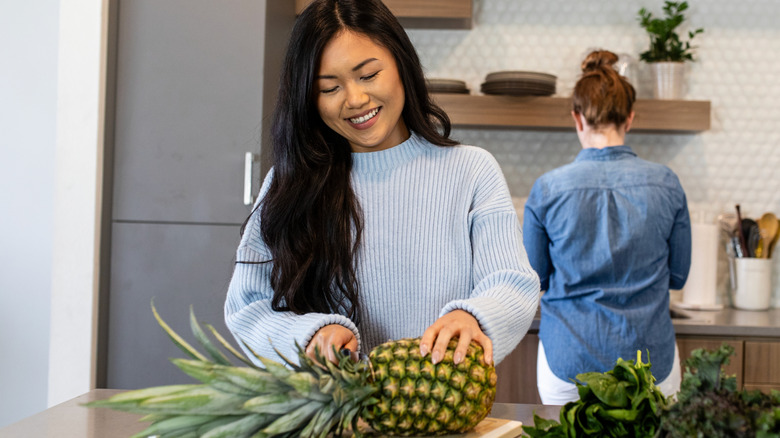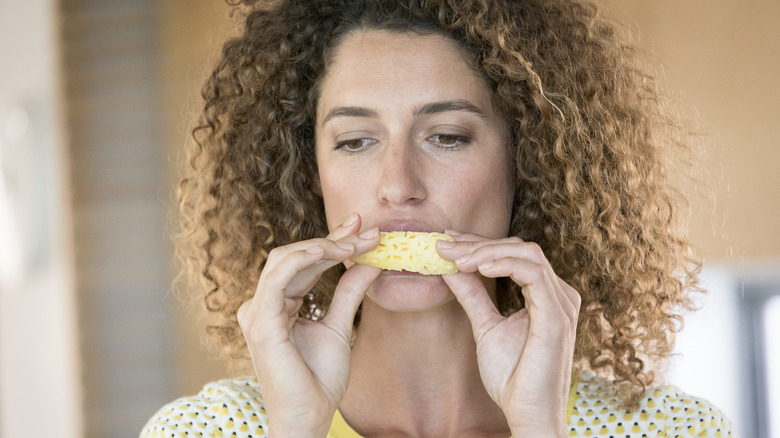
Pineapple, with its subtly tart and sweet flavor, is one of the world’s most beloved tropical fruits. Commonly found in vibrant fruit salads and occasionally topping pizzas, it also boasts numerous health benefits. Rich in vitamin C, pineapple can enhance immunity, and its fiber content aids digestion. But did you know it might also help you sleep better? (This is just one potential benefit of eating pineapple daily.)
This is because pineapples can boost the body’s production of melatonin, a naturally occurring hormone often taken before bed by those who struggle with sleep. If you prefer not to use a supplement—either due to concerns about the safety of daily melatonin use or a desire to naturally improve sleep through diet—adding pineapple might be an excellent option. A 2013 study in the Journal of Agricultural and Food Chemistry revealed that consuming pineapple can increase melatonin levels in the body by an impressive 266%.
Sleep coach Cali Bahrenfuss, CCSH, RPSGT, emphasizes the importance of timing for maximum overnight benefits. “If falling asleep at bedtime is an issue, eating pineapple one to two hours before bed may help one fall asleep as the highest concentration of melatonin happens around two hours after consumption,” she shared with Sleepopolis.
The science behind the pineapple-sleep connection

Pineapple is abundant in tryptophan, an amino acid that the body uses to produce serotonin. Since the body cannot produce tryptophan on its own, consuming foods that contain it is essential for maintaining adequate levels. The body then uses it to create serotonin, a neurotransmitter that plays a crucial role in sleep by promoting relaxation and sound rest.
The brain also relies on serotonin to synthesize melatonin, which signals the brain that it’s time to sleep. Additionally, pineapple provides vitamin B6, which aids in efficiently converting tryptophan into serotonin.
Incorporating pineapple into your evening routine is simple. Dice it and enjoy it with a sprinkle of cinnamon for a balanced nighttime snack that tastes delightful (furthermore, discover what happens when you eat cinnamon daily). Alternatively, mix pure pineapple juice with sparkling water for a fun nighttime beverage, especially in the summer. Keeping chopped pineapple in the fridge ensures you can grab a few bites before bed.
How pineapple became a viral sleep sensation

In today’s world, something doesn’t truly seem popular until it goes viral, and pineapple has certainly captured the internet’s attention. Its viral status was not just due to its nutritional benefits or delicious taste but also its potential to enhance sleep quality. The #PineappleHacks hashtag has garnered millions of views on TikTok.
Dr. Amy Lee, head of nutrition at Nuicific, mentioned to Delish, “[c]onsumption of pineapple does indeed result [in] a higher level of melatonin metabolites compared to other fruits.” TikTok user Emma Robles posted a video enjoying the fruit, saying, “Eating pineapple before bed helps me fall asleep faster and sleep so much better.”
While pineapple may not replace your entire bedtime routine, it can be a wise addition for those seeking a natural sleep aid. This tropical fruit offers a refreshing flavor with a slight bite and serves as a sweet, healthy dessert alternative. It also supports your sleep-wake cycles, helping you rest more comfortably.




